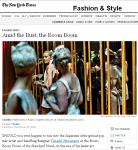By Barbara Glickstein, MPH, MS, RN. Glickstein is an independent broadcast journalist in NYC and a member of AJN‘s editorial board.
I’m a feminist, public health nurse, and journalist. I know how powerful the mass media is, and I keep an eye on how it represents women—as well as on how it represents and reports about nurses and nursing.
Last week was Fashion Week in New York City and the top designers, after-parties, gossip, and trends were analyzed and criticized. Even so, I was pretty surprised last Saturday when I found two separate NY Times articles on Fashion Week referring to nurses. One by Cathy Horyn, “Even Walking Away, They Still Look Good,” had this line describing a dress by a designer: “One of Ms. Scott’s signature headmistress dresses, in pink wool, had a candy-striper pink collar. It didn’t exactly say ’nurse.’”
 The second article, by Guy Trebay, quoted fashion designer Cynthia Rowley, who described a waitress “moving with gymnastic ease” through the crowd while adorned in an elegant dress at a new hot spot in Manhattan: “When you come in and see her, at first she’s like a beautiful nurse in white, bringing you your cocktail.” When once she’s dispensed her curative potions, Ms. Rowley added, the nurse–waitress magically “becomes an angel.” And, after a certain amount of time on the job at the Boom Boom Room, the nurse–angel–waitress, Ms. Rowley suggested, “may well ’become a bride’ to one of the monied denizens of this very world.”
The second article, by Guy Trebay, quoted fashion designer Cynthia Rowley, who described a waitress “moving with gymnastic ease” through the crowd while adorned in an elegant dress at a new hot spot in Manhattan: “When you come in and see her, at first she’s like a beautiful nurse in white, bringing you your cocktail.” When once she’s dispensed her curative potions, Ms. Rowley added, the nurse–waitress magically “becomes an angel.” And, after a certain amount of time on the job at the Boom Boom Room, the nurse–angel–waitress, Ms. Rowley suggested, “may well ’become a bride’ to one of the monied denizens of this very world.”
Here’s the recap on the images: nurse as candy striper (usually a volunteer, unpaid and often of high school age) or this one: nurse → angel → bride (to very rich man). Here we are in the heat of a national debate on health care reform—there are two sexist images of nurses in the fashion section and not one story about our critical role in health care reform. Why aren’t we on the front page and out of the fashion section in the 21st century?
![]()

This is a sad thing. As I have previously posted, we must start at the bedside by clarifying our role and promoting ourselves as professionals. Let’s not allow such stereotypes to persist.
The persistence of these harmful stereotypes also undermine the appeal of our profession to men.
– Lyall Furphy RN